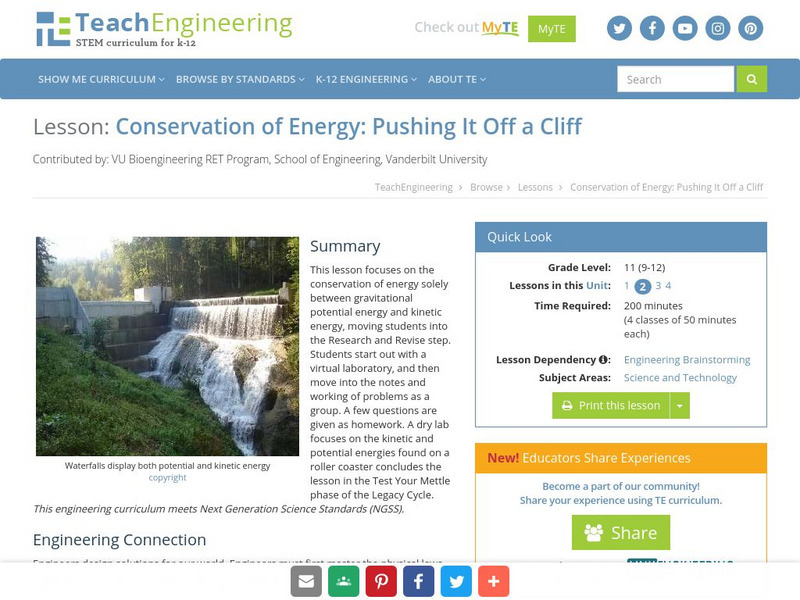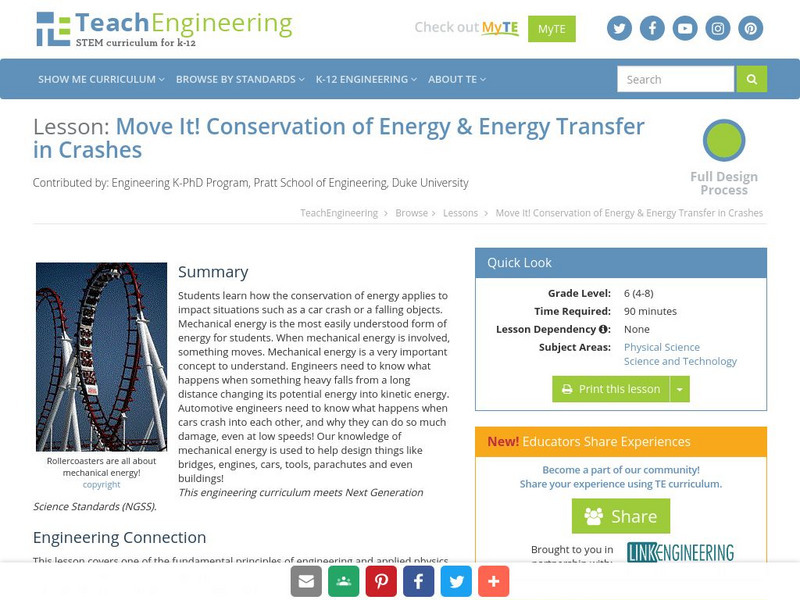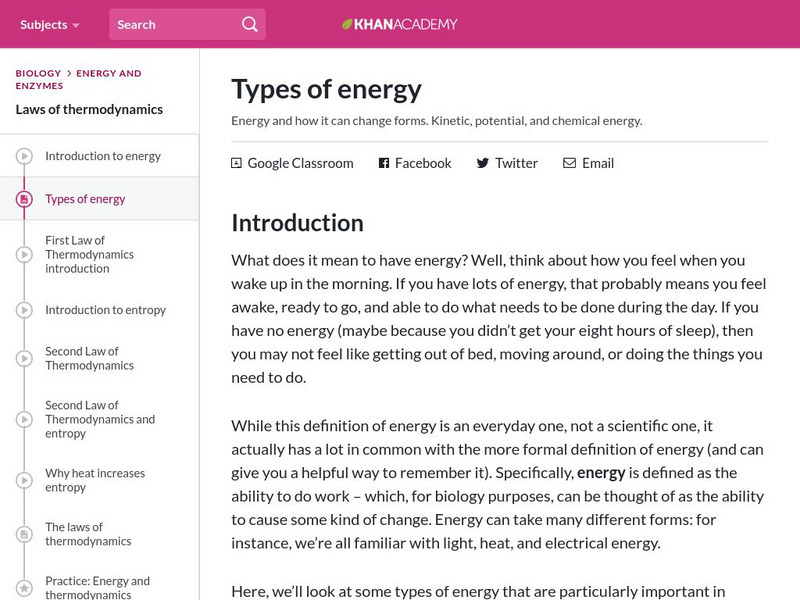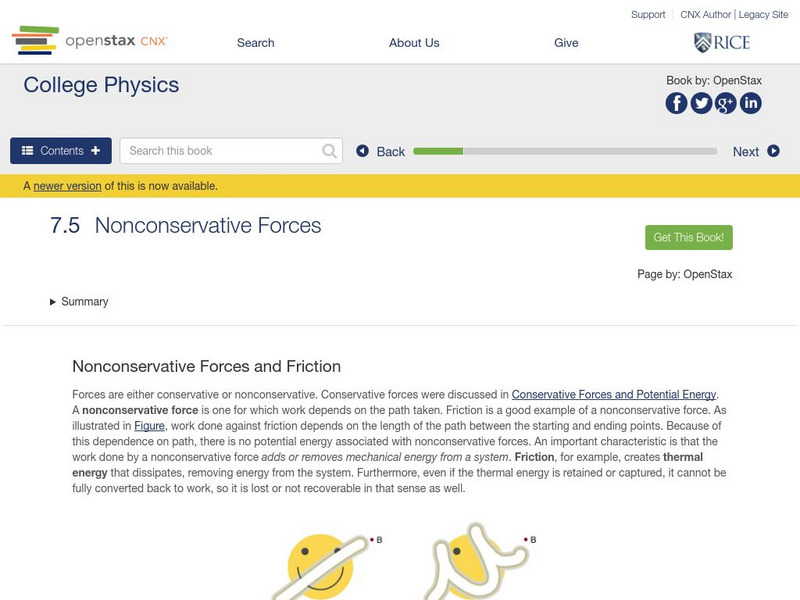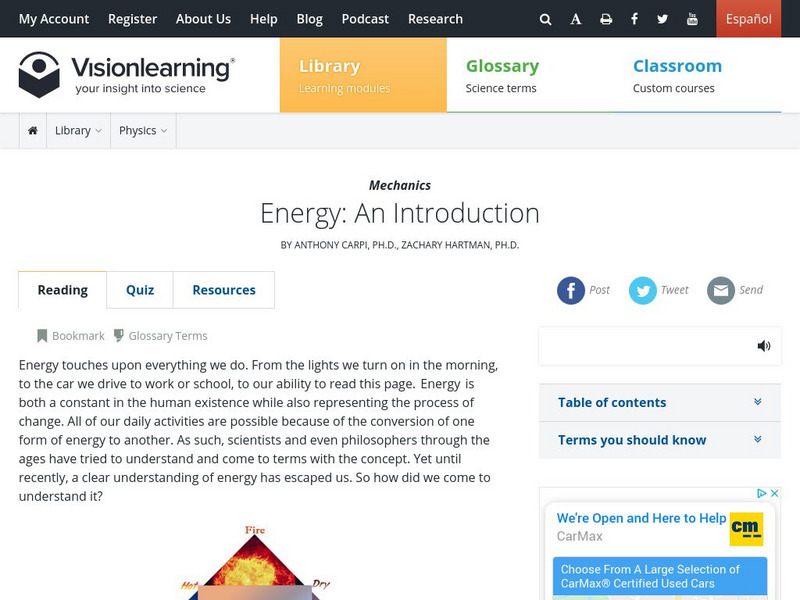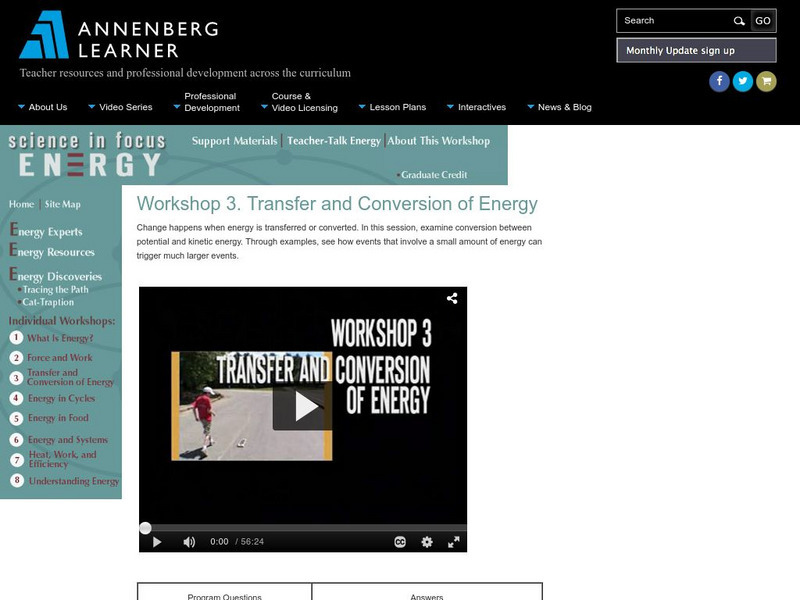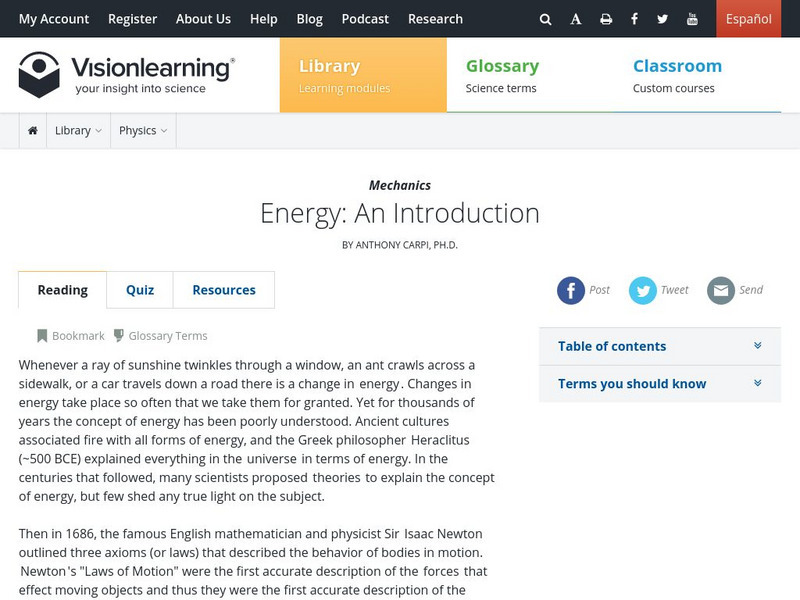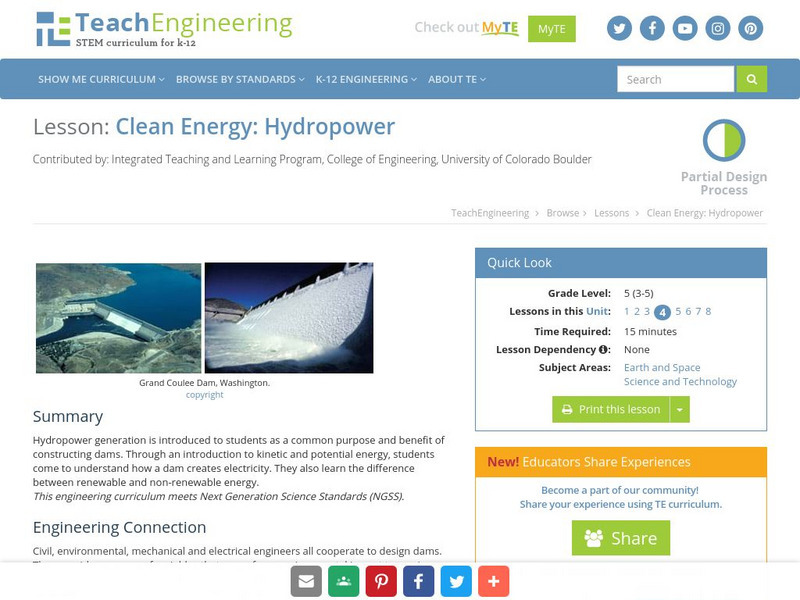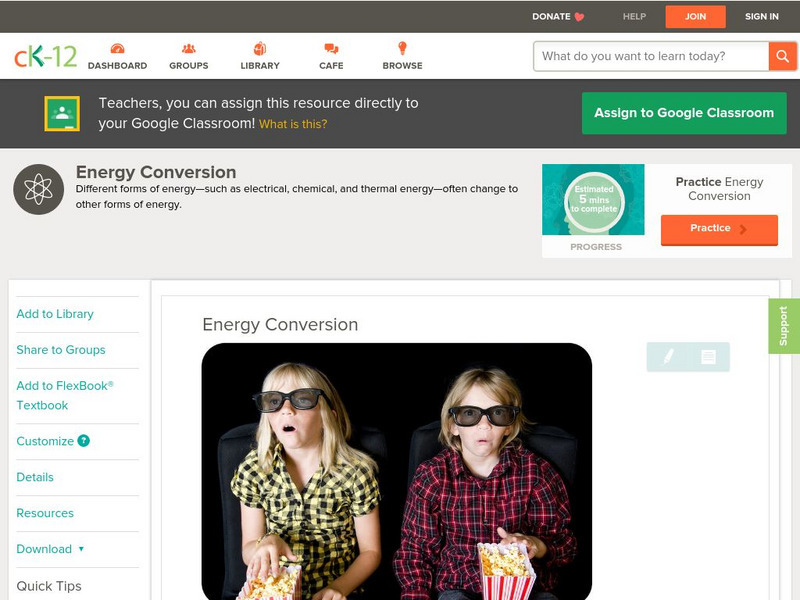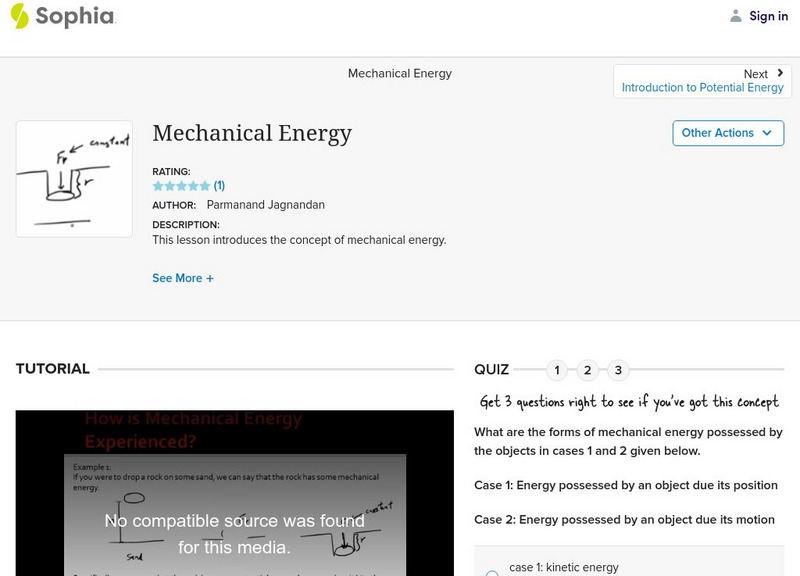Hi, what do you want to do?
Physics Aviary
Physics Aviary: Universal Gravitation Potential Energy Lab
This lab is designed to have students investigate the energy added to an object when it is moved away from another object. This lab is meant to lay the foundations for the idea of universal gravitational energy. Students will see how the...
Sophia Learning
Sophia: Gravitational Potential Energy & Work
This lesson explains how gravitational potential energy and work are related.
Sophia Learning
Sophia: Introduction to Potential Energy
This lesson introduces the concept of potential energy.
Sophia Learning
Sophia: Practice W/ Gravitational Potential Energy
This lesson provides the learner with example problems on calculating gravitational potential energy.
CK-12 Foundation
Ck 12: Physics: Energy Study Guide
Understand and review energy concepts with this study guide.
Better Lesson
Better Lesson: Drop and Pop Energy and Speed Exploration
Fourth graders use a toy to make observations that speed is related to the amount of energy in an object as well as work with gravitational and elastic potential energy.
TeachEngineering
Teach Engineering: Hybrid Vehicle Design Challenge
This module is written for a first-year algebra-based physics class, though it could easily be modified for conceptual physics. It is intended to provide hands-on activities to teach the overarching concept of energy, as it relates to...
TeachEngineering
Teach Engineering: Pushing It Off a Cliff
Lesson 2 moves into the Research and Revise step and focuses on the conservation of energy solely between gravitational potential energy and kinetic energy. Students start out with a virtual laboratory, and then move into the notes and...
TeachEngineering
Teach Engineering: Move It!
Mechanical energy is the most easily understood form of energy for learners. When there is mechanical energy involved, something moves. Mechanical energy is a very important concept to understand. Engineers need to know what happens when...
Khan Academy
Khan Academy: Biology: Enzymes and Energy: Types of Energy
An article that reviews over the different types of energy: kinetic, potential, and chemical.
TeachEngineering
Teach Engineering: Falling Water
Students drop water from different heights to demonstrate the conversion of water's potential energy to kinetic energy. They see how varying the height from which water is dropped affects the splash size. They follow good experiment...
OpenStax
Open Stax: Nonconservative Forces
In the following interactive students will begin to define nonconservative forces and explain how they affect mechanical energy. They will show how the principle of conservation of energy can be applied by treating the conservative...
TeachEngineering
Teach Engineering: How a Hybrid Works
In Lesson 4, students conclude the Research and Revise step of the Legacy Cycle, as they investigate different forms of hybrid engines as well as briefly conclude a look at the different forms of potential energy. Students apply basic...
Science Buddies
Science Buddies: Balloon Car
Students will design, build, and race balloon-powered cars in this fun instructional activity that teaches about engineering design and kinetic and potential energy.
Georgia Department of Education
Ga Virtual Learning: Electric Fields and Electric Potential
In this interactive lesson unit, students will learn about electric fields and charge density. They will explore electric field diagrams and learn how they are used, as well as discover electrostatic potential energy and how it relates...
Vision Learning
Visionlearning: Mechanics: Energy
Definitions of various forms of energy are presented along with a brief scientific history of energy related concepts.
Annenberg Foundation
Annenberg Learner: Science in Focus: Energy: Transfer and Conversion of Energy
Change happens when energy is transferred or converted. Included with the teaching unit, is a sixty-minute video that examines the conversion between potential and kinetic energy.
Vision Learning
Visionlearning: General Science: Energy: An Introduction
Instructional module focusing on energy. Discussion includes forms of energy, conservation of energy, and the laws of thermodynamics. Site also includes an interactive practice quiz and links relating to the topic.
Texas Education Agency
Texas Gateway: Forms of Energy
Given diagrams, illustrations, or descriptions, students will identify the types of energy.
TeachEngineering
Teach Engineering: Clean Energy: Hydropower
Hydropower generation is introduced to students as a common purpose and benefit of constructing dams. Through an introduction to kinetic and potential energy, students come to understand how a dam creates electricity. They also learn the...
Physics Classroom
The Physics Classroom: Motion of a Mass on a Spring
This tutorial investigates the motion of a mass on a spring and how a variety of quantities change over the course of time. Such quantities will include forces, position, velocity and energy - both kinetic and potential energy. Take the...
CK-12 Foundation
Ck 12: Physical Science: Energy Conversion
[Free Registration/Login may be required to access all resource tools.] Decribes how energy changes from one form to another and energy changes between kinetic and potential energy.
Sophia Learning
Sophia: Mechanical Energy
Understand when objects have mechanical energy with this video lesson. Also learn the difference between potential and kinetic energy. The video also discusses the factors that influence both potential and kinetic energy using examples....
Concord Consortium
Concord Consortium: Energy of a Pendulum
In this interactive, drag a pendulum to set its initial height and observe how height is related to potential energy. Then release the pendulum and observe the change from potential energy to kinetic energy, and ultimately to thermal...
Other popular searches
- Kinetic and Potential Energy
- Potential Energy Diagram
- Gravitational Potential Energy
- Kinetic Potential Energy
- Elastic Potential Energy
- Calculating Potential Energy
- Physics Potential Energy
- Potential Energy Pendulum
- Kinetic vs. Potential Energy
- Forms of Potential Energy
- Potential Energy and Water
- Kinetic vs Potential Energy











